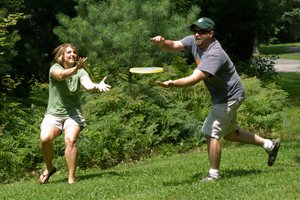Eye Injuries
More than 40,000 eye injuries occur each year during sports activities. About 90 percent of these can be prevented. Basketball and baseball cause the most eye injuries followed by racquet sports such as tennis and racquetball.
Common eye injuries and treatment recommendations include:
Corneal abrasions
A corneal abrasion is a scratch on the eye that can be quite uncomfortable, cause eye redness and light sensitivity.
If you have scratched your eye, don't rub or patch it. A patch may provide the ideal environment for bacteria to grow and cause infection. Keep the eye closed or loosely tape a paper cup or eye shield over it. See your doctor as soon as possible to make sure the object is removed and to assess damage it may have caused.
If an object has penetrated the eye, such as a piece of metal or glass, emergency room treatment is necessary.
'Black eye'
A simple "black eye" from being struck by a baseball can look bad, especially in the days following the accident as bruising gets worse. For the most part, this injury will heal on its own. Ice is a good way to reduce swelling and pain that may be involved. Watch for other symptoms to make sure there is no head injury or something more serious.
Hyphema
A hyphema (high-FEE-mah) is bleeding in the anterior chamber of the eye, the space between the cornea and iris.
Hyphemas and fractures under the eyeball are serious medical emergencies requiring immediate attention in an emergency department. They are caused by significant blunt force trauma to the eye and face such as being hit by a bat, baseball, hockey stick or puck; or getting kicked in the face.
Sunlight
Sunlight or radiation from the sun can be quite damaging to the eye. Despite wearing sunglasses and shading protection, this may not be enough to protect your eyes.
If your eyes have gone without protection for a long time, they will eventually break down and disease may be inevitable. To prevent diseases from affecting your eyes, you must wear sunglasses that are at least UV400 and keep your eyes shaded as much as possible.
Sports goggles with polycarbonate lenses are often recommended, as are helmets in some contact sports. Talk with your coach or health care provider about eyewear or facial protection required for your sport.
If you have a suggestion for a topic to be covered in
Sports Wrap, email
sports.medicine@marshfieldclinic.org.
